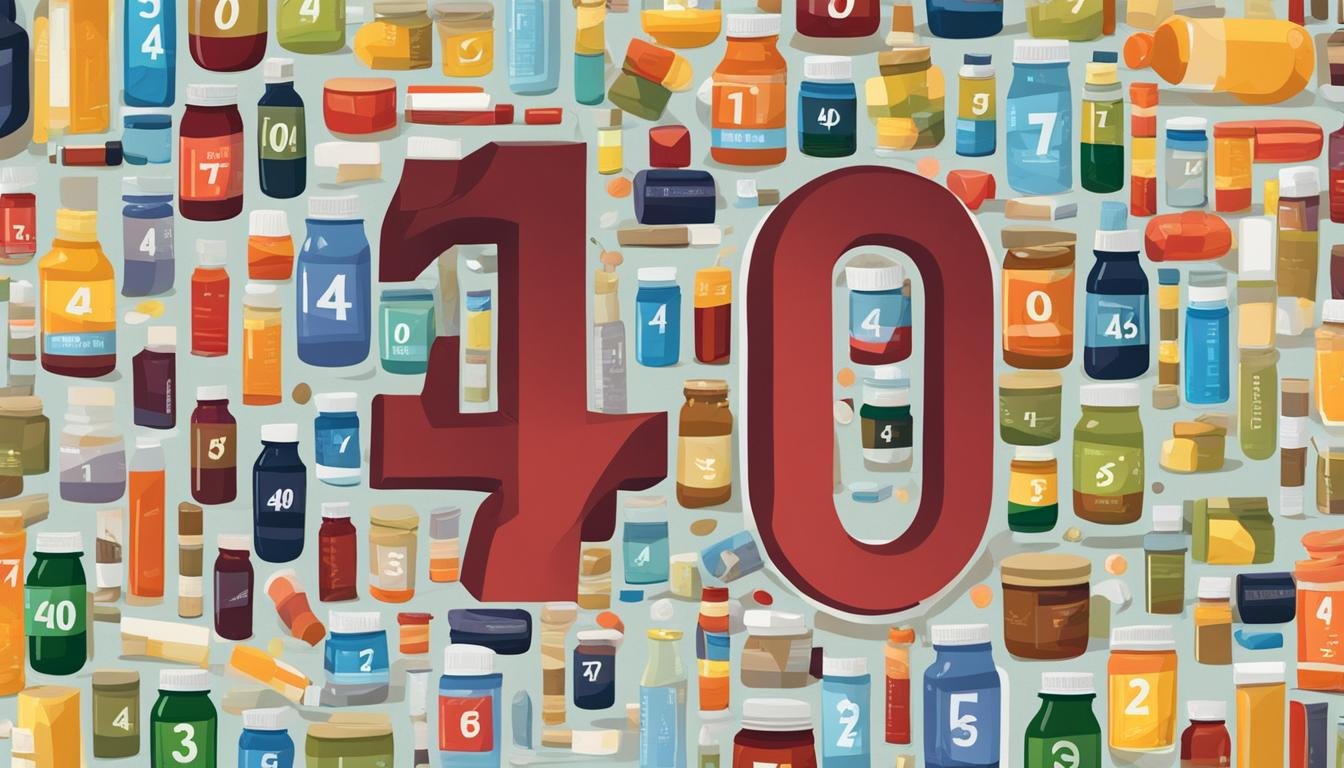As we enter our 40s, it becomes crucial to prioritize our health and ensure that we are providing our bodies with the necessary nutrients. Dietary supplements can play a key role in supporting our overall well-being during this stage of life. In this article, we will explore the most effective dietary supplements for individuals in their 40s, helping you optimize your health and vitality.
Key Takeaways:
- As we age, our nutrient requirements change, and it becomes important to meet these needs through dietary supplements.
- Vitamin B12, calcium, vitamin D, magnesium, omega-3 fatty acids, probiotics, zinc, and selenium are essential supplements for adults in their 40s.
- These supplements support blood and brain function, bone health, heart and brain health, gut health, and immune health.
- Ensure a balanced diet and consult with a healthcare practitioner for personalized guidance.
- By incorporating these supplements into our routine, we can optimize our health and promote holistic well-being in our 40s and beyond.
The Importance of Nutrients in your 40s
As you age, your body goes through various changes, and it’s essential to meet your nutrient requirements to support healthy aging. Around the age of 40, muscle mass starts to deteriorate, weight gain becomes more likely, and the risk of chronic diseases such as cancer, heart disease, and diabetes increases. Additionally, nutrient absorption can decline with age. Prioritizing the right vitamins and nutrients becomes crucial to support your body’s changing needs.
Ensuring a healthy aging process requires providing your body with the necessary nutrients to maintain optimal function and reduce the risk of age-related ailments. Nutrient requirements in your 40s differ from those in your younger years, requiring additional attention to support overall well-being.
Age-related changes, such as muscle deterioration and increased risk of chronic diseases, highlight the importance of proper nutrition in your 40s. Focusing on a nutrient-rich diet and considering dietary supplements can help bridge the gap between your nutrient requirements and what you may obtain from food alone. This proactive approach can support healthy aging and reduce the risk of age-related ailments.
| Nutrient | Function | Sources |
|---|---|---|
| Vitamin B12 | Supports blood and brain function | Meat, fish, dairy, eggs |
| Calcium | Builds and maintains bone health | Dairy products, tofu, sardines, broccoli, almonds, spinach |
| Vitamin D | Protects against age-related changes | Sunlight exposure, vitamin D3 supplement |
| Magnesium | Regulates blood pressure and more | Dark leafy greens, beans, soy, nuts, seeds, avocados |
| Potassium | Maintains healthy blood pressure | Bananas, sweet potatoes, chard, beans, lentils |
| Omega-3 Fatty Acids | Promotes heart and brain health | Fish, walnuts, flaxseeds, leafy vegetables |
| Probiotics | Supports gut health and weight management | Yogurt, sauerkraut, kombucha |
| Zinc | Boosts immunity and overall health | Seafood, meat, fortified cereals |
| Selenium | Boosts immunity and overall health | Lean meats, cereals, dairy products |
Vitamin B12: Supporting Blood and Brain Function
When it comes to maintaining optimal health and well-being in your 40s and beyond, vitamin B12 is a key nutrient to focus on. This essential vitamin plays a crucial role in supporting normal blood and brain function. However, as we age, the body’s ability to absorb B12 can decline, making it important to ensure adequate intake through supplementation.
Vitamin B12 is necessary for the production of healthy red blood cells, which carry oxygen throughout the body. It also supports the proper functioning of nerve cells, including those in the brain. Adequate levels of B12 are important for maintaining cognitive function and overall brain health.
To ensure you are getting enough vitamin B12, it is recommended to supplement with 2.4 mg per day, particularly after the age of 40. While younger adults can usually obtain sufficient B12 from food sources such as meat, fish, dairy, and eggs, absorption can become less efficient as we get older. Supplementing with B12 is a simple and effective way to support normal blood and brain function in your 40s and beyond.
Table: Food Sources of Vitamin B12
| Food | Vitamin B12 Content (mcg per serving) |
|---|---|
| Clams (cooked, 3 ounces) | 84.1 |
| Beef liver (cooked, 3 ounces) | 70.7 |
| Fish (trout, salmon, tuna, cooked, 3 ounces) | 2.5-5.1 |
| Fortified breakfast cereals (various brands, 1 serving) | 0.6-4.0 |
| Milk and dairy products (various, 1 cup) | 0.9-3.2 |
| Eggs (cooked, 1 large) | 0.6 |
Introducing vitamin B12 supplementation into your daily routine can help ensure that you are giving your body the support it needs for normal blood function and optimal brain health. It’s important to consult with a healthcare practitioner to determine the appropriate dosage and to discuss any potential interactions with other medications or existing health conditions.

Calcium: Building and Maintaining Bone Health
Calcium plays a vital role in building and maintaining bone health, making it an essential nutrient to prioritize in your 40s and beyond. As you age, your body may lose more bone than it builds, leading to fragile and brittle bones. This increased risk of osteoporosis highlights the importance of adequate calcium intake to support bone strength and prevent fractures.
Women aged 40 to 50 should aim for 1,000 mg of calcium per day, while women over 50 need 1,200 mg per day. Incorporating calcium-rich foods into your diet is an excellent way to meet your daily needs. Dairy products like milk, cheese, and yogurt are well-known sources of calcium. Additionally, foods like tofu, sardines, broccoli, almonds, and spinach are also rich in this essential mineral.
“Ensuring sufficient calcium intake is crucial, especially as we age and become more vulnerable to bone-related conditions like osteoporosis,” emphasizes Dr. Sarah Johnson, a renowned nutrition expert. “By incorporating calcium-rich foods into our diet or considering calcium supplements if necessary, we can actively support our bone health as we enter our 40s.”
Table: Top Calcium-Rich Foods
| Food | Calcium Content (per serving) |
|---|---|
| Milk | 300 mg |
| Cheese (cheddar) | 200 mg |
| Yogurt | 300 mg |
| Tofu (calcium-fortified) | 250 mg |
| Sardines (canned with bones) | 300 mg |
| Broccoli | 50 mg |
| Almonds | 75 mg |
| Spinach | 180 mg |
It’s important to note that while calcium-rich foods are a great way to meet your needs, some individuals may require calcium supplements to ensure adequate intake. Consult with a healthcare professional to determine if supplements are necessary for you, especially if you have specific dietary restrictions or medical conditions that affect calcium absorption.
Vitamin D: Protecting Against Age-Related Changes
In your 40s and beyond, vitamin D becomes increasingly important in protecting against age-related changes. Vitamin D plays a crucial role in calcium absorption, which is essential for maintaining strong bones and preventing conditions like osteoporosis. Additionally, vitamin D is involved in various bodily functions, including immune system regulation and cell growth.
While sunlight is a natural source of vitamin D, many individuals may not get enough sunlight exposure to meet their daily needs, especially those living in areas with limited sunlight. In such cases, a vitamin D3 supplement can ensure optimal intake. Aim for at least 600 IU of vitamin D per day, but consult with your healthcare practitioner for personalized guidance based on your specific needs.
To emphasize the importance of vitamin D, let’s take a look at the following table:

| Benefits of Vitamin D | Food Sources | Recommended Daily Intake |
|---|---|---|
| Supports calcium absorption for strong bones | Fatty fish (salmon, mackerel), fortified dairy products, egg yolks | 600-800 IU for adults |
| Enhances immune system function | Mushrooms, fortified cereals, cod liver oil | |
| May reduce the risk of certain cancers | Fatty fish (salmon, mackerel), fortified orange juice, beef liver |
As seen in the table, vitamin D can be obtained from various food sources. However, it can be challenging to meet the recommended daily intake solely through diet. Therefore, a vitamin D3 supplement can be a convenient way to ensure adequate vitamin D levels, especially for individuals with limited sunlight exposure.
Remember, maintaining optimal vitamin D levels is just one piece of the puzzle for overall health and wellness. Consult with your healthcare practitioner to determine the best approach for your specific needs and to ensure that vitamin D supplementation is appropriate for you.
Magnesium: Regulating Blood Pressure and More

If you’re looking for a mineral that can have a significant impact on your overall health, look no further than magnesium. This essential nutrient plays a key role in regulating blood pressure, maintaining heart function, and supporting several other bodily processes.
One of the main benefits of magnesium is its ability to regulate blood pressure levels. Studies have shown that adequate magnesium intake can help lower blood pressure and reduce the risk of hypertension, a leading risk factor for heart disease. By incorporating magnesium-rich foods into your diet or considering a magnesium supplement, you can support healthy blood pressure levels and promote cardiovascular well-being.
In addition to its role in blood pressure regulation, magnesium also plays a crucial role in maintaining optimal heart function. This mineral is involved in maintaining a steady heartbeat and supporting the normal electrical activity of the heart. By ensuring an adequate intake of magnesium, you can help protect against cardiovascular disorders and promote overall heart health.
Magnesium-Rich Foods
- Dark leafy greens: Spinach, kale, and Swiss chard are excellent sources of magnesium.
- Nuts and seeds: Almonds, cashews, and pumpkin seeds are all magnesium-rich options.
- Legumes: Black beans, lentils, and chickpeas provide a good amount of magnesium.
- Avocado: This creamy fruit is not only a source of healthy fats but also contains magnesium.
By including these magnesium-rich foods in your diet, you can ensure that you’re getting enough of this essential mineral to support blood pressure regulation, heart function, and overall wellness.
| Food | Magnesium Content (per 100g) |
|---|---|
| Spinach | 79mg |
| Almonds | 270mg |
| Black Beans | 120mg |
| Avocado | 29mg |
Table: Magnesium content in select foods
Remember, it’s always essential to consult with a healthcare professional before starting any new supplement regimen. They can help determine the right dosage and provide personalized recommendations based on your specific health needs.
Potassium: Maintaining Healthy Blood Pressure
Incorporating adequate amounts of potassium in your diet is essential for maintaining healthy blood pressure levels. Potassium is a mineral that plays a vital role in regulating fluid balance, supporting proper muscle function, and promoting optimal heart health. By including potassium-rich foods in your daily meals, you can ensure that your body receives this crucial nutrient.
Here are some potassium-rich foods that you can incorporate into your diet:
- Bananas
- Avocados
- Sweet potatoes
- Spinach
- Tomatoes
While it is generally recommended to obtain potassium from food sources, there may be certain situations where potassium supplements are prescribed by a healthcare professional. It’s important to consult with your doctor before starting any new supplement.

Additional Tips for Maintaining Healthy Blood Pressure
- Reduce your sodium intake by avoiding processed foods and opting for fresh, whole foods.
- Engage in regular physical activity, such as brisk walking or cycling, to support cardiovascular health.
- Manage stress levels through relaxation techniques like deep breathing exercises or meditation.
- Limit alcohol consumption to moderate levels or avoid it altogether.
- Quit smoking if you are a smoker, as it can contribute to high blood pressure.
By adopting a balanced lifestyle that includes a potassium-rich diet and healthy habits, you can help maintain healthy blood pressure levels and support your overall well-being.
Omega-3 Fatty Acids: Promoting Heart and Brain Health
Omega-3 fatty acids are essential nutrients that offer numerous health benefits, particularly for heart and brain health. They play a crucial role in lowering blood pressure, reducing the risk of heart disease, and supporting cognitive function. Including omega-3-rich foods in your diet and considering omega-3 supplements can help you optimize your health in these areas.
Omega-3-rich foods are abundant and can be easily incorporated into your meals. Fish, such as salmon, mackerel, and sardines, are excellent sources of omega-3 fatty acids. Walnuts, flaxseeds, and leafy green vegetables like spinach and kale are also high in omega-3s. By including these foods in your diet, you can naturally boost your intake of these beneficial fatty acids.
Research has shown that omega-3 fatty acids can lower blood pressure and reduce the risk of heart disease. They also support cognitive function, helping to maintain brain health as we age.
If necessary, omega-3 supplements can be a convenient way to ensure you’re getting an adequate intake of these essential nutrients. Depending on your specific health needs, a daily dosage of 500 mg to 2,000 mg of omega-3 fatty acids is typically recommended. Consult with a healthcare practitioner to determine the right dosage for you.
| Food Source | Omega-3 Fatty Acid Content (per 100g) |
|---|---|
| Salmon | 2,260 mg |
| Mackerel | 4,107 mg |
| Sardines | 1,480 mg |
| Walnuts | 9,080 mg |
| Flaxseeds | 22,813 mg |
| Spinach | 0.37 mg |
| Kale | 0.3 mg |
Omega-3 Fatty Acids and Heart Health
Omega-3 fatty acids have been extensively studied for their positive impact on heart health. They can help reduce inflammation, lower triglyceride levels, and improve overall heart function. Including omega-3-rich foods in your diet or taking supplements can be beneficial for individuals looking to support cardiovascular well-being and reduce the risk of heart disease.
Probiotics: Supporting Gut Health and Weight Management
In your 40s, maintaining good gut health and managing weight can become more challenging. Probiotics are beneficial bacteria that play a vital role in supporting your digestive system and overall well-being. They help maintain a healthy balance of gut flora, improve digestion, and enhance nutrient absorption.
Probiotics can also aid in weight management. Some studies have shown that certain strains of probiotics may help reduce body weight and body mass index (BMI). They can also help regulate appetite and reduce the risk of obesity-related health problems, such as type 2 diabetes and heart disease.
Include probiotic-rich foods in your diet to boost your gut health. Yogurt, kefir, sauerkraut, kimchi, and kombucha are excellent sources of probiotics. These foods contain live cultures of beneficial bacteria that can colonize your gut and promote a healthy microbiome.
| Probiotic-Rich Foods | Benefits |
|---|---|
| Yogurt | Contains Lactobacillus and Bifidobacterium strains that improve digestion and boost immune function. |
| Kefir | Rich in probiotics that support gut health and may help reduce inflammation. |
| Sauerkraut | Provides beneficial bacteria that aid in digestion and improve nutrient absorption. |
| Kimchi | Contains Lactobacillus strains that enhance gut health and may lower cholesterol levels. |
| Kombucha | A fermented tea that offers probiotic benefits and supports gut health. |
If you have difficulty obtaining enough probiotics from food sources, you can consider taking a probiotic supplement. Look for a high-quality probiotic that provides a variety of strains and has a high colony-forming unit (CFU) count. It’s recommended to consult with a healthcare practitioner or a registered dietitian to determine the right probiotic supplement for your needs.
Zinc and Selenium: Boosting Immunity and Overall Health
When it comes to maintaining our health and well-being, it’s essential to prioritize the nutrients that our bodies need. In our 40s and beyond, this becomes even more crucial as our immune health and bone health can start to decline. That’s where zinc and selenium come in, two minerals that play a vital role in boosting immunity and supporting overall health.
Zinc is known for its ability to regulate hormone balance, protect against neurodegenerative diseases, and promote strong bones. It is involved in over 300 enzymatic reactions in the body, making it an essential mineral for our overall health. Some zinc-rich foods that you can incorporate into your diet include seafood, meat, and fortified cereals.
Selenium, on the other hand, protects our cells from oxidative damage, supports thyroid function, and reduces the risk of heart disease and cancer. Including selenium-rich foods such as lean meats, cereals, and dairy products can help ensure adequate selenium intake.
| Zinc-rich Foods | Selenium-rich Foods |
|---|---|
| Seafood | Lean meats |
| Meat | Cereals |
| Fortified cereals | Dairy products |
Both zinc and selenium are crucial for a strong and healthy immune system, helping to protect against illnesses and infections. They also contribute to overall vitality and well-being, supporting our bodies as we age. If you’re unsure about your zinc and selenium levels, it may be worth considering a dietary supplement to ensure you’re getting enough of these essential minerals.
Remember, it’s always a good idea to consult with a healthcare practitioner before starting any new dietary supplement or making significant changes to your diet. They can provide personalized guidance based on your specific needs and health goals.
Conclusion
As you enter your 40s, it’s crucial to prioritize your health and provide your body with the necessary nutrients. Dietary supplements can play a valuable role in supporting your overall well-being during this stage of life. By incorporating key supplements into your routine, you can optimize your health and promote holistic well-being.
Some of the most effective dietary supplements for individuals in their 40s include vitamin B12, calcium, vitamin D, magnesium, omega-3 fatty acids, probiotics, zinc, and selenium. These supplements can help address specific needs and deficiencies that may arise with age, ensuring that your body is functioning at its best.
Remember, it’s important to consult with a healthcare practitioner to determine the dosage and specific supplements that are right for you. They can provide personalized guidance based on your individual needs and health goals.
By taking control of your health and incorporating these dietary supplements into your daily routine, you can optimize your well-being and enjoy a thriving and vibrant life in your 40s and beyond.
FAQ
What are the most effective dietary supplements for individuals in their 40s?
The most effective dietary supplements for individuals in their 40s include vitamin B12, calcium, vitamin D, magnesium, omega-3 fatty acids, probiotics, zinc, and selenium.
Why is it important to prioritize nutrients in your 40s?
It is important to prioritize nutrients in your 40s because your body goes through various changes, and meeting your nutrient requirements can support healthy aging, prevent chronic diseases, and ensure optimal overall health.
How does vitamin B12 support blood and brain function?
Vitamin B12 supports normal blood and brain function. As you age, absorption of B12 can become less efficient, so supplementing with 2.4 mg per day is recommended to ensure adequate intake after the age of 40.
Why is calcium important for building and maintaining bone health?
Calcium plays a vital role in building and maintaining bone health. As you age, your body can lose more bone than it builds, leading to fragile and brittle bones. Adequate calcium intake is crucial to prevent conditions like osteoporosis.
What is the role of vitamin D in protecting against age-related changes?
Vitamin D helps with calcium absorption and is involved in various bodily functions. It is essential for protecting against age-related changes that can occur as you get older. Consider taking a vitamin D3 supplement if you cannot obtain sufficient levels from sunlight exposure alone.
How does magnesium regulate blood pressure and support overall health?
Magnesium plays a key role in regulating blood pressure, heart function, muscle and nerve function, and blood glucose control. It is important to aim for 320 mg of magnesium per day to support your overall health.
How can potassium help maintain healthy blood pressure?
Potassium is vital for maintaining healthy blood pressure, regardless of age. Higher intake of potassium from food sources is associated with decreased stroke risk. Include potassium-rich foods in your diet to ensure adequate intake.
What are the benefits of omega-3 fatty acids for heart and brain health?
Omega-3 fatty acids help lower blood pressure, reduce the risk of heart disease, and support cognitive function. Including omega-3-rich foods in your diet or taking omega-3 supplements can provide these health benefits.
How do probiotics support gut health and weight management?
Probiotics promote a healthy gut microbiome, support digestion, and may lower the risk of heart disease, diabetes, and stroke. Including probiotic-rich foods in your diet or taking a probiotic supplement can ensure an adequate intake of beneficial bacteria.
What are the benefits of zinc and selenium for immunity and overall health?
Zinc helps regulate hormone balance, protect against neurodegenerative diseases, and promote strong bones. Selenium protects cells from oxidative damage, supports thyroid function, and reduces the risk of heart disease and cancer. Including zinc-rich and selenium-rich foods in your diet can provide these benefits.
How can dietary supplements support optimum health in your 40s and beyond?
By incorporating key dietary supplements into your routine, you can optimize your health and promote holistic well-being in your 40s and beyond. These supplements can help fill nutrient gaps and support your body’s changing needs as you age.






